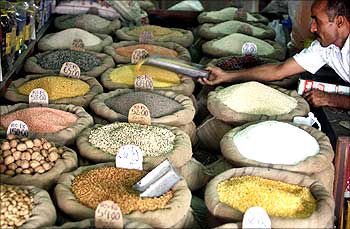 After a gap of nearly three months, food inflation fell to a single digit at 9.52 per cent for the week ended February 26 on account of a decline in prices of potatoes, pulses and wheat.
After a gap of nearly three months, food inflation fell to a single digit at 9.52 per cent for the week ended February 26 on account of a decline in prices of potatoes, pulses and wheat. Food inflation stood at 10.39 per cent in the previous week.
The rate of price rise of food items has fallen to a single-digit figure for the first time since the week ended December 4, 2010, when it was 9.46 per cent.
The latest figures are expected to give a breather to the government, which has been under increasing pressure to rein in the inflationary pressure caused by high food and crude oil prices.
For the week under review, prices of wheat declined by 1.07 per cent on an annual basis, while pulses rates fell by 3.91 per cent.
Prices of potatoes also fell by nearly 9 per cent year-on-year.
However, vegetables continued to be expensive and their prices went up by 9.23
per cent on annual basis.
In particular, onion prices were up by 3.90 per cent year-on-year. Rice also became dearer by 1.16 per cent year-on-year.
Egg, meat and fish became 15.38 per cent costlier.
Meanwhile, fruits prices rose by 18.75 per cent and milk by 8.42 per cent on an annual basis.
The non-food articles category saw a price rise of 29.85 per cent during the week on an annual basis.
Fuel and power also became 9.48 per cent more expensive, while petrol became costlier by 23.14 per cent.
High food prices have been one of the major factors behind high overall inflation.
Headline inflation in the country stood at 8.23 per cent in January and the government has exuded confidence that it will fall to 7 per cent by March-end.







